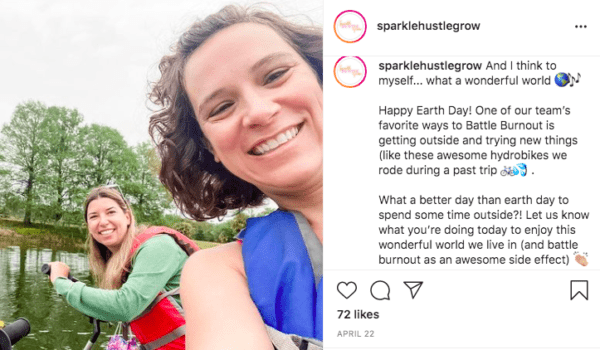Establishing meaningful relationships with customers can yield significant benefits. As technology is driving many aspects of company development, business transactions sometimes lack interpersonal components. Leveraging human-to-human interactions can allow subscription businesses to develop a loyal consumer base and minimize this disconnect.
Customer satisfaction is a top priority for many brands. According to a SuperOffice study, over 45% of businesses prioritize creating a good customer experience over everything else. The reason being: people adjust their purchasing decisions based on their buying experience.

When subscription entrepreneurs attach a personal image to their brand, they can build stronger connections with subscribers and gain more support as they expand their business. In the subscription industry, this personal branding can supplement sellers’ long-lasting relationships with buyers.
SUBTA recently hosted a panel discussion, Subscription Innovators – Celebrating Women Leaders in this Growing Industry, which featured four subscription founders: Julie Ball of Sparkle Hustle Grow, Saidah Farrell of Marshmallow of the Month Club, Jill Lodato of Kids Baking Club, and Akeelah Kuraishi of Little Global Citizens.
Each panelist shared unique experiences of being a women entrepreneur, balancing work and family life, and growing an online community surrounding a brand. Moreover, each founder detailed their experience branding themselves to their audience, and why it’s important to connect with consumers on a personal level.
Using Personal Branding to Build Brand Authenticity
Managing an online presence can better link products with consumers. According to a Sprout Social report, nearly 90% of people buy from brands they follow on social media. However, most customers believe brands create inauthentic content. When a brand message appears fabricated, consumers tend to disengage. Twenty percent of consumers unfollow a brand on social media because of insincere, corporate content.
Personal branding can help develop stronger business relationships online. By introducing yourself to customers, they can view you as more than a seller. This strategy can improve brand authenticity and transparency, which can lead to social media engagement and consumer loyalty.
“In the beginning [of my subscription box business] I was not a part of my personal brand… I kept my face hidden away, and I did that because my target market doesn’t look like me,” said Farrell, founder of Marshmallow of the Month Club. “My mentor challenged me to do a post and put my face out there, and do like five facts about myself. And since I’ve done that, it’s been my most engaged post… I feel like they’re buying into me… It resonates with some people.”
Once people understood Farrell’s business from an operational point of view, they reacted positively. “Being the face of my brand has been huge for growing the brand itself,” she said.
Farrell launched Marshmallow of the Month Club in 2019 to create gourmet marshmallows for those who abstain from pork products. Since then, her goal has been to inspire other subscription box startups, while also growing her subscriber base.
Leveraging Brand Authenticity to Earn Credibility
A subscription brand’s credibility has a large impact on consumer’s buying decisions. In fact, over 80% of consumers need to trust a brand in order to buy from them. When companies establish this trust, consumers are more likely to remain loyal and refer their products to others.
Personal branding can be an effective strategy in building rapport with customers. According to Sprout Social, “70% of consumers feel more connected to brands with CEOs that are active on social.” Buyers enjoy getting to know the person behind the business, and entrepreneurs can apply this strategy to set their company apart from the rest.

Photo Credit: @joinkidsbakingclub on Instagram
“There’s this big sea of subscription boxes, and you have to be that fish that has a unique costume on that [consumers] can immediately recognize as you,” said Lodato, founder and CEO of Kids Baking Club. Lodato launched her subscription business in June 2020 after her preschool closed due to the pandemic. Kids Baking Club grew from 23 subscribers to 540 in seven months, making it a projected six-figure business in 2021.
Consumers tend to prioritize a human message over one that appears automated and disingenuous. Over 90% of consumers would take buying recommendations from individuals over brand advertisements, according to Nielsen. Entrepreneurs can use their personal brands within the company’s voice and branding as one strategy to increase revenue.
“Right now, people just want a human that connects with us. We [as entrepreneurs] can drive that and make something,” added Lodato, “we [as business founders] are educators, mentors, and coaches… we are telling people how to use the products. We are building that trust brand with our buyers… Personal branding is essential right now.”
Farrell connects with her audience by responding to every Marshmallow of the Month Club review on CrateJoy. By engaging with subscribers on a personal level, Farrell is able to maintain a high customer satisfaction rate. Nearly 90% of her CrateJoy customers have given her company a 5-star rating.
Other panelists have also found success by including themselves in their brand’s image. Lodato is the host of Kids Baking Club’s Youtube channel, which has over 53k subscribers. Kuraishi and Ball both attach personal posts to their company’s Instagrams, which have over 11k and 20k followers respectively.
The Benefits of Brand Transparency
Consumers tend to trust businesses that communicate an open and honest message to their subscribers. Eighty-one percent of consumers “believe businesses have a responsibility to be transparent when posting on social media,” according to Sprout Social. When a brand lacks this, subscribers may leave a company for another alternative. The same study shows that eighty-six percent of consumers will stop buying from a company if it lacks transparency.
Transparency is especially important amongst small businesses. A Red Egg Marketing study reports that 70% of consumers would go out of their way to support small businesses. Another study by SalesForce, saw nearly 90% of consumers willing to “pay a little more to work with a small business.” Showcasing the behind the scenes of your company gives subscribers more reasons to buy into you and your product.

Photo Credit: @sparklehustlegrow on Instagram
“People want to buy from other people, they don’t want to buy from a brand… and especially those people that love to support small businesses,” said Ball, founder and Chief Sparkler at Sparkle Hustle Grow. Ball has turned Sparkle Hustle Grow into an award-winning, multi-six-figure subscription company. She’s even launched Subscription Box Bootcamp to provide supportive, personal development and business training to thousands of women and has been featured in Forbes, Business Insider, and USA Today.
“I’m the face of the brand, and once I started to show up and share my entrepreneurial story, [my audience] could relate to me better,” said Ball, “I would share wins and I would also share failures. That’s one of the things that made me more relatable… Having that transparency and showing that this is not corporate America… People want to buy from a person, not a brand.”
Aligning with Consumers’ Values
Buying from purpose-driven brands gives consumers a sense of satisfaction. Most consumers buy from companies that align with their values, and this is particularly the case amongst millennials.
Many buyers feel more in touch with companies that are striving to make a difference in the world. Kuraishi outlines the importance of having a genuine business model that consumers can resonate with.
“Introduce yourself and tell people why you started [your] business,” Kuraishi said, “I did not start [my] business to make loads of money. I started this business because I had a really authentic experience when I traveled around the world that I wanted to bring to my family.”
Kuraishi started her subscription business to provide convenience to families who experience traveling challenges. As an entrepreneur and mother, she found her own traveling experience to be tricky with young kids, so she launched Little Global Citizens, which brings international culture to customers’ front door. Since then, Kuraishi’s educational subscription box has been featured on USA Today, Forbes, Huffington Post, and Buzzfeed.
Building a Company That Reflects You
It can be hard to introduce yourself to your customers. However, in doing so, people can better understand who they’re buying from. This can lead many subscribers to develop a personal connection with you and your brand.
“Although I’m shy, watching others has given me the confidence to introduce myself,” Kuraishi said, “It makes it so much more natural and down to earth and people feel like they know you. You have personal connections.”
Building trust with customers can ultimately increase customer retention and consumer lifetime value. When consumers trust a company, they are more likely to remain loyal and refer their products to others.
In a world of increased automation, human connection sometimes gets lost in the mix. Fostering meaningful relationships within the subscription industry can allow buyers and sellers to come together, build impactful communities and enhance the shopping experience. As a subscription entrepreneur, it’s always important to think of new ways to reach new customers and retain existing ones. Many subscribers may be interested in getting to know you and what you stand for: so introduce yourself!

